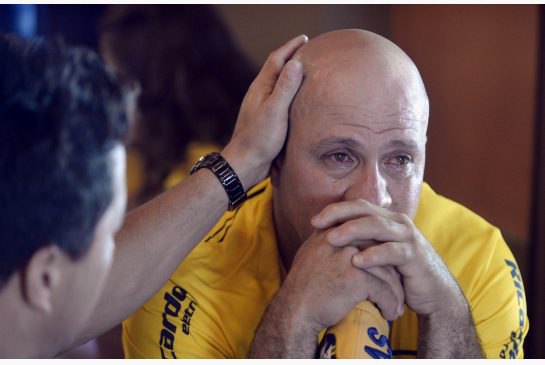 I don't actually have cable (see here to read why), so I couldn't watch the game between Brazil and Germany. But I figured it would be like most other soccer games - 90 minutes of running around with only 1 goal to show for it.
I don't actually have cable (see here to read why), so I couldn't watch the game between Brazil and Germany. But I figured it would be like most other soccer games - 90 minutes of running around with only 1 goal to show for it.
Late last night I checked Facebook and saw this post from a friend of mine - "The grown men crying in this World Cup are breaking my heart." Grown men crying?
I figured it was a joke, but when I checked ESPN for the score, I realized that it was not a joke (although it took me about 5 minutes to believe the final score of 7-1 was accurate). And then I began seeing all of these images of grown men (and women) crying, just like the Facebook post said.

And this video is pretty sad to watch...
I don't know much about soccer, but I am familiar enough with the sport to know that 7-1 is pretty abnormal. As I listened to analysis, and read various articles (like USA Today Sports), it sounded like folks already saw weakness in Brazil's game, so when they lost two main players, their weakness was really exposed.
One player, Neymar, was injured by a knee to the back during Brazil's previous match against Colombia, and a second player, Silva, couldn't play because he received too many yellow cards.
Could it be that one team was buoyed up by just two people? That without these two players a whole system just falls apart? Apparently.
How strong is your team?
When I gave a user group presentation back in April, an attendee mentioned that she couldn't leave or else things wouldn't get done (or she had to redo everything because tasks were done incorrectly). Frankly, that didn't surprise me - I think a large portion of nonprofits and for-profits operate with the same risks. If one person leaves, things begin falling apart.
If operations fall apart when you leave, you have a problem (and your organization has an even bigger problem). An important practice for any Admin or trainer is build a team that can survive, and maybe even thrive, when you can't be there to support it.
Building up your core group
In every organization, there is at least one other individual besides you who likes getting technical - your job is to find him/her/them and build a core group of super users.
You can't be the only superstar who knows the ins and outs of Salesforce, otherwise you're going to have an emotional breakdown. Identify at least one other person who is geeky, and continue to recruit folks as they show interest. Your super users don't have to be the smartest people in the room, they just need to be interested in learning more.
Developing your super users
Your core group of super users don't have to know everything about Salesforce, but they should know enough to take over when you're gone for a dentist appointment or leave for a weeklong cruise.
Have special meetings with them to teach them what you know. Encourage your super users to walk the halls and speak with other users to get a sense of what the problems are, and then listen to them as they report back their findings.
Send your super users to user group meetings and have them go through Salesforce videos on the YouTube channel so they can understand as much as possible - that will enable them to act on their own and make good decisions when it comes down to it.
Let them support your team
When Brazil lost their two main players, others had to fill in without having much experience. What a terrible time to learn on the job!
Instead of hoping your super users can handle things while you're gone, let them take charge of things while you're still around so you can coach and help them learn before it really counts.
Also, people actually enjoy being helpful. If your super users are helping others, they'll look forward to taking more off of your plate.
Don't be the superstar
You can be a superstar, but don't be the only one. Sure it's nice for the ego, but it's terrible for work/life balance.
Develop other superstars who can take over when you can't handle the workload. Otherwise, your team will look like Brazil against Germany, and we don't need to see anymore grownups crying.
